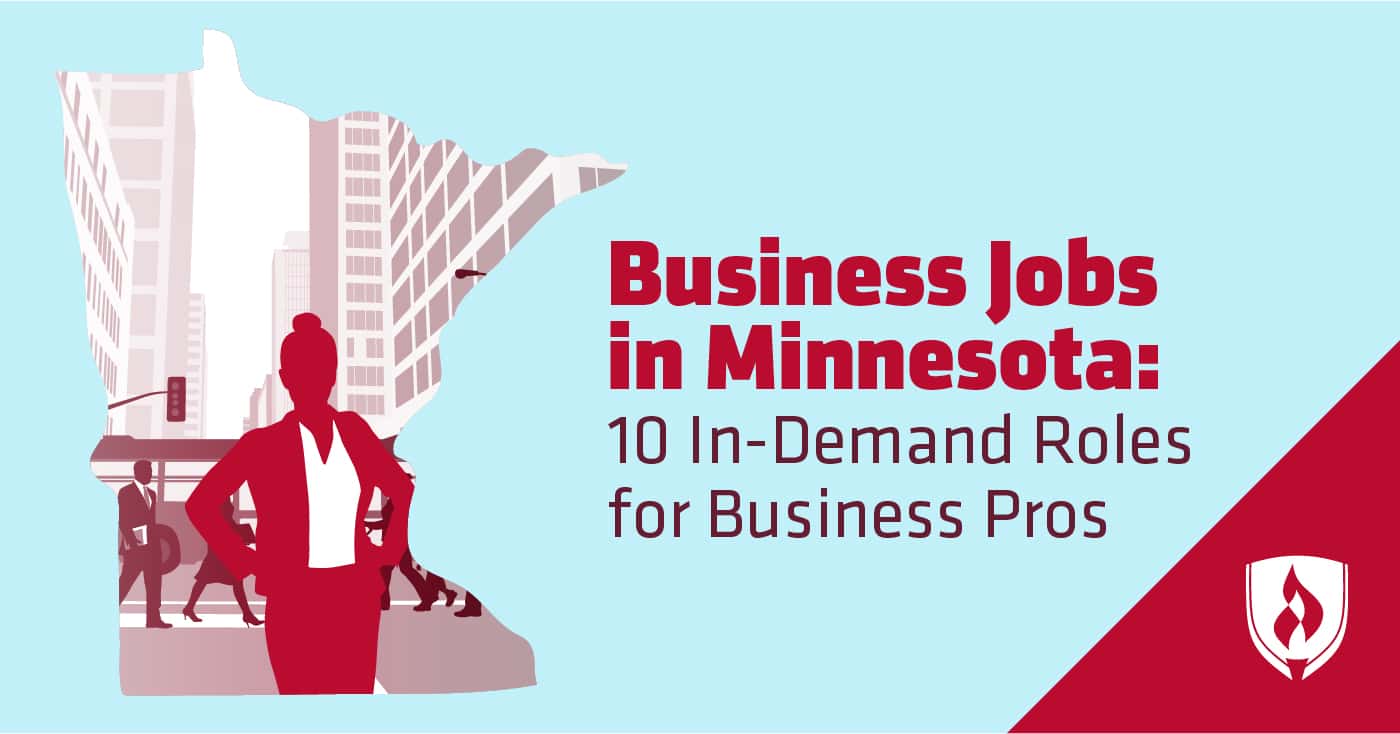
Committing to a college education path is something you know takes careful consideration. The days of just choosing any subject you find interesting without much thought about what you’ll actually do with that degree are fading fast. You know you want to be practical with your investment into education, and one obviously practical field to explore is business.
You know there’s a lot of potential jobs under the “business” umbrella, but details matter—particularly local details. Is the Minnesota job market a good place to start a marketing career? What about human resources? Who’s hiring? You’ve likely got about as many questions as Minnesota has lakes—and we’re hoping to help answer some of the important ones.
So get your forks ready, because we’ve got the hot dish on business jobs in Minnesota.
Top Minnesota employers seeking business degree holders
So who’s hiring business pros in Minnesota? To help provide some prospective, we used real-time job analysis software to identify the employers with the most job postings seeking candidates with a business-related degree in the past year. Here’s what we found:1
- UnitedHealth Group
- Wells Fargo
- Anthem Blue Cross
- State of Minnesota
- U.S. Bancorp
- Mayo Foundation for Medical Education and Research
- Fairview Health Services
- Cargill Incorporated
- Prime Therapeutics
- Ecolab Incorporated
While this is by no means a comprehensive look at potential employers in Minnesota, it does give you an idea of some of the larger employers and the variety of industries you could apply your skills in. As you can see, healthcare and healthcare-related employers make up about half of this list.
That said, those employers are still looking to fill a variety of roles and job types—despite the healthcare focus, the organizations still need finance, accounting and HR professionals to operate.
Top business jobs employers are seeking to fill in Minnesota
Let’s move beyond specific employers’ needs and take a step back to examine some of the most sought-after business occupations in Minnesota. Again, job posting analysis software helped us scour more than 46,000 Minnesota job postings to identify 10 of the most common occupations seeking candidates with business-related degrees.1
Below we’ll pair that information with Minnesota-specific job market data from the Bureau of Labor Statistics to give you a snapshot of the Minnesota business jobs landscape.
1. Sales representatives
Sales representatives are the direct, customer-facing arms of a business’ marketing department. These professionals make connections with important stakeholders in a purchase decision, answer their questions and ultimately facilitate the completion of a purchase. Depending on the role, they may work in business to consumer (B2C) or business to business (B2B) sales.
Sales representatives in both arrangements aim to sell products or services, but there are distinct differences in their audiences’ needs, concerns and motivators. As you might expect, sales representatives need excellent communication skills, empathy and drive to be successful.
- Related job titles: Account manager, account executive, inside sales representative, account representative
- 2016–2026 Employment growth projection (MN): 6 percent2
2. Financial analysts
Financial analysts are the finance professionals responsible for providing guidance to businesses and individuals who make investment decisions. To do this, they review relevant financial statements, track industry trends, research relevant market information and use advanced statistical analysis methods.
While you might expect to find financial analysts working for large banks or financial services providers, there’s also a need for these analysts in the insurance industry. To succeed in this role, you’ll need to be analytical, mathematically-inclined and a strong communicator.
- Related job titles: Pricing analyst, portfolio manager, financial consultant
- 2016–2026 Employment growth projection (MN): 10 percent2
3. Marketing managers
Marketing managers are the senior-level marketing professionals who oversee teams of marketing specialists. While the details of their work will vary from role to role, they generally are responsible for creating and carrying out strategic plans for increasing sales.
Additionally, marketing managers are often responsible for managing team dynamics, setting internal goals, presenting strategic plans and communicating results. This role requires extensive experience, with many marketing professionals working first in specialist roles before transitioning into a management or leadership role.
- Related job titles: Product manager, director of marketing, digital marketing manager, product marketing manager
- 2016–2026 Employment growth projection (MN): 8 percent2
4. Human resources specialists
Human resources (HR) specialists are the administrative professionals that help keep an organization’s internal operations running smoothly. The key task of employee recruitment and onboarding is often a focal point for HR specialists—they’ll conduct screening interviews, follow-up on references and help with orientation training.
Beyond recruiting and onboarding, HR specialists may also work on researching employee benefits and compensation packages, conducting exit interviews with departing employees and addressing employee issues or concerns. Interpersonal skills are highly valuable in this role—HR specialists are contacting prospective employees regularly and must navigate sensitive employee issues with empathy and professionalism.
- Related job titles: human resources generalist, recruiter, human resources analyst, talent acquisition specialist
- 2016–2026 Employment growth projection (MN): 5 percent2
5. Accountants
Accountants always have their eye on an organization’s bottom line—it’s hard not to when your entire job revolves around providing an accurate financial picture of an organization’s finances. They review important financial records for accuracy and compliance with regulatory standards and ensure any taxes are paid properly and on time.
Accountants have a unique picture into the financial health of an organization and may be called upon to suggest ways to improve profitability. These professionals have an eye for detail, dive deep into documentation and enjoy solving the complex “puzzles” that can come with incomplete or incorrect financial information.
- Related job titles: Staff accountant, tax accountant, accounting analyst, cost accountant
- 2016–2026 Employment growth projection (MN): 9 percent2
6. Bookkeeping, accounting and auditing clerks
Bookkeepers and accounting clerks are the accounting and finance professionals who assist in the production of accurate financial records. Professionals in these roles often use accounting software to input and track expenses, credits and other financial information.
Some may be responsible for overall upkeep of an organization’s general ledger, while other clerks may have more specialized tasks in accounts payable or receivable. These roles value candidates who are organized, pay attention to details and take a methodical approach to their work.
- Related job titles: accounts payable clerk, accounting clerk, accounts receivable specialist, accounting assistant
- 2016–2026 Employment growth projection (MN): -3 percent2
7. Market research analysts and marketing specialists
Market research analysts and other specialists are at the forefront of executing marketing plans. Market research duties can include crafting surveys, conducting user testing, producing competitive analysis documentation and researching market trends. Other specialists may focus their time on developing marketing strategies and assisting with their tactical execution—whether that’s a social media marketing campaign, a roll out of new store branding materials or the creation of a new lead-generating website.
With such a wide variety of specialized roles under this occupational umbrella, it’s true there’s not really a one-size-fits-all set of skills or traits needed for success. Generally these specialists will benefit from strategic thinking ability, organizational skill, creativity and the ability to empathize with their target audiences.
- Related job titles: Marketing specialist, marketing coordinator, marketing analyst, social media specialist, digital marketing strategist
- 2016–2026 Employment growth projection (MN): 20 percent2
8. Sales managers
Sales managers are the experienced sales professionals who are tasked with overseeing a team. They use market data to forecast sales, set team and individual sales goals, plan discount strategies and provide professional training to new representatives.
Like with sales representatives, their organization may focus on either business to consumer sales or business to business sales, with the target audience heavily influencing their strategic approach. To excel as a sales manager you’ll need interpersonal skills, a desire to achieve and a knack for motivating and coaching others to success.
- Related job titles: Director of sales, business development manager, regional sales manager, district sales manager
- 2016–2026 Employment growth projection (MN): 6 percent2
9. Management analysts
Does your organization have a problem? Management analysts can help solve it. These business professionals are tasked with reviewing processes, organizational structures and the other inner workings of an organization in order to provide recommendations for improvement. Many of these professionals work as specialized consultants who assist organizations by providing niche areas of expertise that may not be available internally.
In their work they’ll meet with key stakeholders, review processes for inefficiencies, project the potential impact of a change, create reports and present recommendations to leadership teams. These professionals are analytical, curious, thorough and polished presenters.
- Related job titles: Business analyst, business consultant, business process analyst, senior business analyst
- 2016–2026 Employment growth projection (MN): 11 percent2
10. Financial managers
The financial manager occupation grouping represents any role responsible for directing and coordinating the activities of finance or accounting professionals in an office, branch or division. These senior-level professionals are responsible for producing finance reports, developing strategic financial plans, managing the needs of their team and more.
Like with accountants, these managers often have a unique view into the financial health of an organization and are called upon to use that perspective when advising business leadership teams.
- Related job titles: Accounting manager, director of finance, accounting supervisor, tax manager
- 2016–2026 Employment growth projection (MN): 17 percent2
Getting down to business up north
After learning more about the wide variety of business jobs in Minnesota, you can see it’s probably a safe move to pursue a business career in the North Star state. With the proper training, there seem to be opportunities for individuals of all types of skills and interests.
The next step is deciding which educational path can lead you to your preferred business job in Minnesota. Learn more about your options in our article, “The Beginner’s Guide to 10 Types of Business Degrees.”
1Burning-Glass (analysis of 46,881 Minnesota job postings seeking candidates with a business-related degree, February 1, 2019 – January 31, 2020)
2Bureau of Labor Statistics, U.S. Department of Labor, Occupational Outlook Handbook, [accessed February 2020] www.bls.gov/ooh/. Employment conditions in your area may vary.




